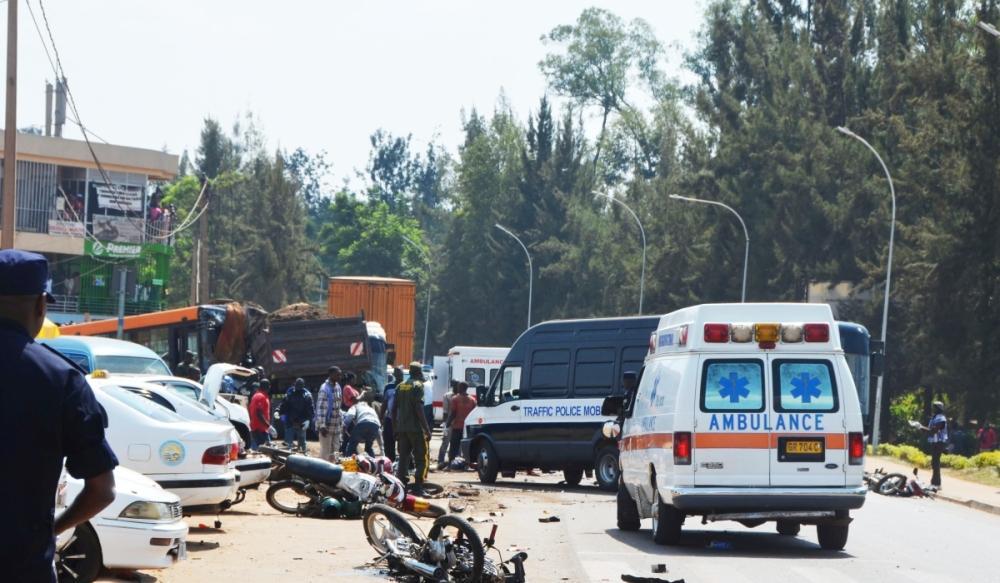Africa-Press – Rwanda. A new law on accident compensation, enacted in October 2025, upheld Rwf3,000 as the minimum daily compensation for victims without verifiable income, an amount originally established by a 2016 Supreme Court ruling.
When the government tabled the bill before Parliament in June 2025, its explanatory note indicated that the proposed revision sought to address insurers’ concerns that the Rwf3,000 set by a judicial precedent had become a high base compensation rate, threatening the sector’s viability.
The draft law therefore proposed lowering the base compensation to Rwf2,000 per day, equivalent to the monthly tax-free income cap of Rwf60,000 in Rwanda.
However, the final version of the law, published in the Official Gazette on October 21, 2025, upheld the Rwf3,000 rate as the legally recognized minimum.
According to the law, in calculating the compensation of the accident victim by the insurance company, a daily wage is calculated from the time of the death to the time they were supposed to clock retirement.
Explaining the rationale, MP Hope Tumukunde Gasatura, Chairperson of the Chamber of Deputies’ Standing Committee on Foreign Affairs, Cooperation and Security, which scrutinised the bill, told The New Times that Parliament’s position was guided by legal precedent and principles of social fairness.
She noted that the Supreme Court’s 2016 decision, which set Rwf3,000 as the daily reference wage, reflected the average earnings of a construction helper (umuyede) at the time and has been in use for almost ten years.
“Given that some casual laborers now earn up to Rwf8,000 per day, some lawmakers even argued that the benchmark should be revised upwards,” she said. “In the end, it was decided to retain the Rwf3,000 but included a clause empowering the responsible minister to increase it when and if necessary.”
According to her, anchoring the amount in statute ensures uniformity and predictability in compensation while safeguarding victims against underpayment.
Responding to insurers’ complaints that the Rwf3,000 baseline remains high—especially since some formal-sector workers with verifiable income earn less—Tumukunde questioned the basis of such claims and also informed that insurers and their regulator were invited for consultations on the bill.
During a session with the Senate’s Committee on Foreign Affairs, Cooperation and Security, on October 31, insurance companies raised concerns about the fact that the newly enacted law on accident victim compensation upheld the Rwf3,000 minimum daily compensation for victims without income proof.
The session focused on evaluating measures to reduce road accidents and enhance safety.
Marc Rugenera, CEO of Radiant Insurance Company, told senators that one of the main challenges affecting the sector’s profitability is the Rwf3,000 compensation floor for accident victims without verifiable income.
He illustrated the impact – especially when people who die in accidents are young, arguing that there are some employees with verifiable but low incomes — less than Rwf3,000 per day — who want to claim compensation based on the higher benchmark.
“The Rwf3,000 daily rate amounts to Rwf90,000 per month — or more than Rwf1 million per year — even for a person without a job. When multiplied by the number of years until retirement age (65), the total becomes unsustainable for insurers,” Rugenera said.
In 2020, insurance companies through their umbrella organisation – Rwanda Insurers’ Association (ASSAR) – petitioned the Supreme Court over lack of minimum wage provided by the 2018 labour law, arguing it created a legal vacuum whereby compensations for accident damages have no legal basis. The minimum wage has not yet been set seven years after the enactment of the labour law.
In their petition, insurers cited a 2016 decision by the Supreme Court in which a judge set Rwf3,000 as the amount of money to be generally considered the daily compensation for a victim of an accident.
They cited the 2016 decision by the Supreme Court in which Rwf3,000 was set as the amount of money to be generally considered the daily compensation for an accident victim in case there is no income proof.
For More News And Analysis About Rwanda Follow Africa-Press






